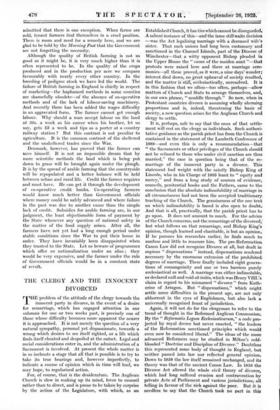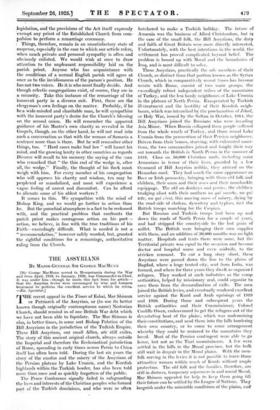THE CLERGY AND THE INNOCENT
DIVORCED
THE problem of the attitude of the clergy towards the innocent party in divorce, in the event of a desire for remarriage, which has engaged attention in our columns for one or two weeks past, is precisely one of those whose difficulty becomes more apparent the nearer it is approached. It is not merely the question of a very natural sympathy, personal yet dispassionate, towards a wrong which desires to see itself righted, or a life which finds itself cheated and despoiled at the outset. Legal and social considerations enter in, and the administration of a Sacrament is involved. At present the whole matter is in so inchoate a stage that all that is possible is to try to take its true bearings and, however imperfectly, to indicate a course of opinion which in time will lead, we may hope, to regularized action.
For, of course, that is the desideratum. The Anglican Church is slow in making up its mind, loves to counsel rather than to direct, and is prone to be taken by surprise by the action of the Legislature, with which, as an Established Church, it has ties which cannot be disregarded. A salient instance of this—and the issue still waits decision —was the Act legalizing marriage with a deceased wife's sister. That such unions had "Ong been customary and sanctioned in the Channel Islands, part of the Diocese of Winchester—that a witty opponent Bishop pleaded in the Upper House the " cause of the maiden aunt "—that protests were raised here and there at marriage cere- monies—all these proved, as it were, a nine days' wonder; interest died down, no great upheaval of society resulted, and the matter still, ecclesiastically, unresolved. It is in this fashion that we often—too often, perhaps—allow matters of Church and State to arrange themselves, and, in our own phrase, " 'Middle through." So now, when in Protestant countries divorce is assuming wholly alarming proportions and is, indeed, threatening the basis of society, a new question arises for the Anglican Church and, clergy to settle.
It is, perhaps, safe to say that the onus of that settle- ment will rest on the clergy as individuals. Such authori- tative guidance as the parish priest has from the Church is contained in the statement of the Lambeth Conference of 1888—and even this is only a recommendation—that " the Sacraments or other privileges of the Church should not be refused to those who under civil sanction are thus married," the case in question being that of the re- marriage of the innocent party in a divorce. This statement had weight with the saintly Bishop King of Lincoln, who in his Charge of 1895 leant to " equity and mercy," and from a long study of sources of evidence; councils, penitential books and the Fathers, came to the conclusion that the absolute indissolubility of marriage in all circumstances had not been the accepted traditionary; teaching of the Church. The genuineness of the one text on which indissolubility is based is also open to doubt; And that is all, practically, that the parish priest has to go upon. It does not amount to much. For the advice of the Church concerns, not the remarriage of the divorced,i, but what follows on that remarriage, and Bisliop King's opinion, though learned and charitable, is but an opinion. If he pursues his researches earlier, he finds, much to confuse and little to reassure him. The pre-Reforniation, Canon Law did not recognize Divorce at all, but dealt in copious " dispensations " instead, dispensations rendered, necessary by the enormous extension of the prohibitedi degrees of marriage. These finally included eight genera tions of consanguinity and one or two barriers purely ecclesiastical as well. A marriage was either indissoluble, or declared null and void ab initio, which.was Henry VIII.'s claim in regard to his misnamed " divorce " from Kath- erine of Arragon. But "dispensations," which might settle some difficulties in the present age, are not only abhorrent in the eyes of Englishmen, but also lack a universally recognized fount of jurisdiction.
Again, it will not do for the clergyman to refer to the trend of thought in the Reformed Anglican Communion. By the Reformatio Legum Eccksiasticarum," a code pro- jected by royal decree but never enacted, " the leaders of the Reformation sanctioned principles which would even now be considered liberal." The ideas of the more advanced Reformers may be studied in Milton's cold- blooded " Doctrine and Discipline of Divorce." Doubtless this represented some body of thought in England, but neither passed into law nor reflected general opinion. Down to 1858 the law itself remained unchanged, and its theory was that of the ancient Canon Law. In 1858 the Divorce Act altered the whole civil theory of divorce„ which had long suffered evasion and contravention by private Acts of Parliament and various jurisdictions; all telling in favour of the rich against the poor. But it is needless to say that the Church took no part in this . legislation, and the provisions of the Act itself expressly exempt any priest of the Established Church from com- pulsion to perform a remarriage ceremony.
Things, therefore, remain in an unsatisfactory state of suspense, especially in the case to which our article refers, when much private and personal sympathy is often and obviously enlisted. We would wish at once to draw attention to the unpleasant responsibility laid on the parish priest. Anyone who has acquaintance with the conditions of a normal English parish will agree at once as to the invidiousness of the parson's position. He has not two voices. He it is who must finally decide. And though eclectic congregations exist, of course, they are in a minority. Take this instance of the remarriage of the innocent party in a divorce suit. First, there are the clergyman's own feelings on the matter. Probably, if he be a wide-minded and charitable man, he will sympathize with the innocent party's desire for the Church's blessing on the second union. He will remember the apparent guidance of his Master's own charity as revealed in the Gospels, though, on the other hand, he will not read into such a conversation as that with the woman of Samaria a sentence more than is there. But he will remember other things, too. " Hard cases make bad law " will haunt his mind, and the growing laxity in other countries as regards Divorce will recall to his memory the saying of the man who remarked that " the thin end of the wedge is, after all, the wedge." Finally, the thought of his flock must weigh with him. For every member of his congregation who will approve his charity and wisdom, ten may be perplexed or scandalized, and most will experience a vague feeling of unrest and discomfort. Can he afford to alienate some of his ablest workers ? • It conies to this. We sympathize with the mind of Bishop King, and we would go further in action than he. But the parochial atmosphere is a fact to be reckoned with, and the practical problem that confronts the parish priest makes courageous action on his part— action, we believe, in line with the true traditions of his Faith—exceedingly difficult. What is needed is not a " recommendation," however safely worded, but, granted the rightful conditions for a remarriage, authoritative ruling 'from the Church.



















































 Previous page
Previous page